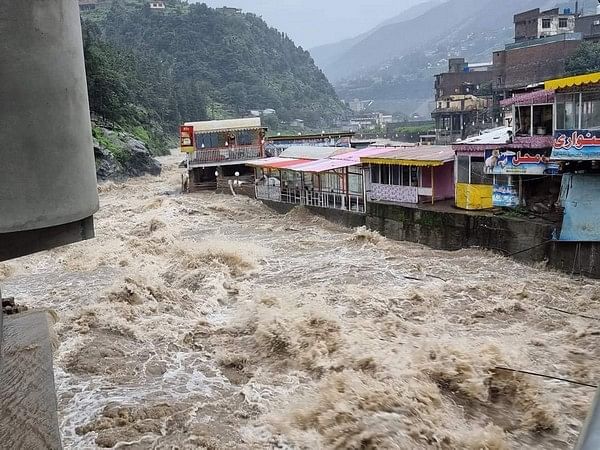Islamabad [Pakistan], September 3 (ANI): As the heavy monsoon rains and floods continue to play havoc with people’s lives and resources in Pakistan, analysts have claimed that climate change produces negative effects on the psychological and reproductive health of women who bear the major brunt of disasters.
A study observed that climate change-related incidents, including floods and disasters, primarily affect women compared to their male counterparts.
“There is evidence that shows interlinkages between climate change, health and sexual and reproductive health and rights (SRHR),” said the study titled ‘Understanding climate change, impact on women’s reproductive health: Post-disaster interventions in Sindh.
Mehmil Khalid, writing for Dunyanews cited the study and said that the scarcity of water and absence of other amenities on which women are highly dependent to run a household leaves them stranded miserably with no availability of resources to feed themselves.
Most women in flood-stricken areas who depend on agriculture experience high yield loss which causes food insecurity and high levels of malnutrition in their bodies. The lack of access to resources generally builds up stress and causes psychological issues in women as they have to keep themselves confined in camps with no water and food nearby.
“Girls and pregnant women are vulnerable to psychological fears. Women and girls felt insecure and psychologically fearful while staying in camps,” says the study.
Experts have noticed that women suffer massively with respect to reproductive health issues during floods.
Some women die or their infants pass away due to severe complications and a lack of medical services to provide urgent aid.
Most women feel hesitant to exercise self-aid due to strict gender barriers and male dominance. They remain constricted to their camps in times of urgent need and are not allowed to move freely if they require help.
Many a time, women face financial problems due to the death of their husbands in camps during floods or even after they leave as they find no means to gain economic security, Khalid wrote.
Domestic violence also surges when families face disasters, leaving men with a loss of livelihoods and increased frustration that it brings with itself.
Men beat women at their camps when they could not find enough resources to eke out a sustainable living. They release their resentful emotions on their women as they believe they are inherently made tolerant to deal with it. The subsequent displacements have been found to increase the cases of domestic/sexual violence that leaves women helpless at the mercy of their husbands, Dunyanews reported.
Analysts said that the devastation caused by flash foods can be avoided if the government put focuses on disaster risk reduction and meticulously invite investments in adaptation and planned rehabilitation of people beforehand in case of an emergency crisis.
They called for a need to introduce gender-sensitive policies, teach women life-saving skills and arrange means for better income generation can help women to be agents of change and reduce their vulnerability.
Climate change-induced disasters are going to get severe in future that can only be mitigated if sustainable policies and climate change adaptation techniques are introduced on a priority basis.
Analysts also called for a need to give women positions in decision-making roles and encourage them to participate in devising rational solutions for climate change-related problems, which can reduce the risks involving women.
“Women interventions in matters dealing with women issues are essential in bringing positive results and quick solutions for problems that they face.” Dunyanews reported citing analysts.
Notably, since mid-June, 937 people have died from severe rain and flooding across the South Asian country, according to the country’s National Disaster Management Authority (NDMA).
The southern province of Sindh, badly hit by the flooding, has asked for 1 million tents, while nearby Balochistan province has requested 100,000 tents. Since mid-June, when the monsoon began, more than 3,000 kilometres (1,864 miles) of road, 130 bridges and 495,000 homes have been damaged, according to NDMA’s last situation report.
As districts in Pakistan continue to be affected by massive monsoon rainfall and unprecedented levels of flooding, the World Health Organization (WHO) has warned of significant public health threats facing affected populations, including the risk of further spread of water and vector-borne diseases such as malaria and dengue fever.
Around 888 health facilities have been damaged in the country, of which 180 are completely damaged, leaving millions of people lacking access to health care and medical treatment, as reported in many affected districts. (ANI)
This report is auto-generated from ANI news service. ThePrint holds no responsibility for its content.



